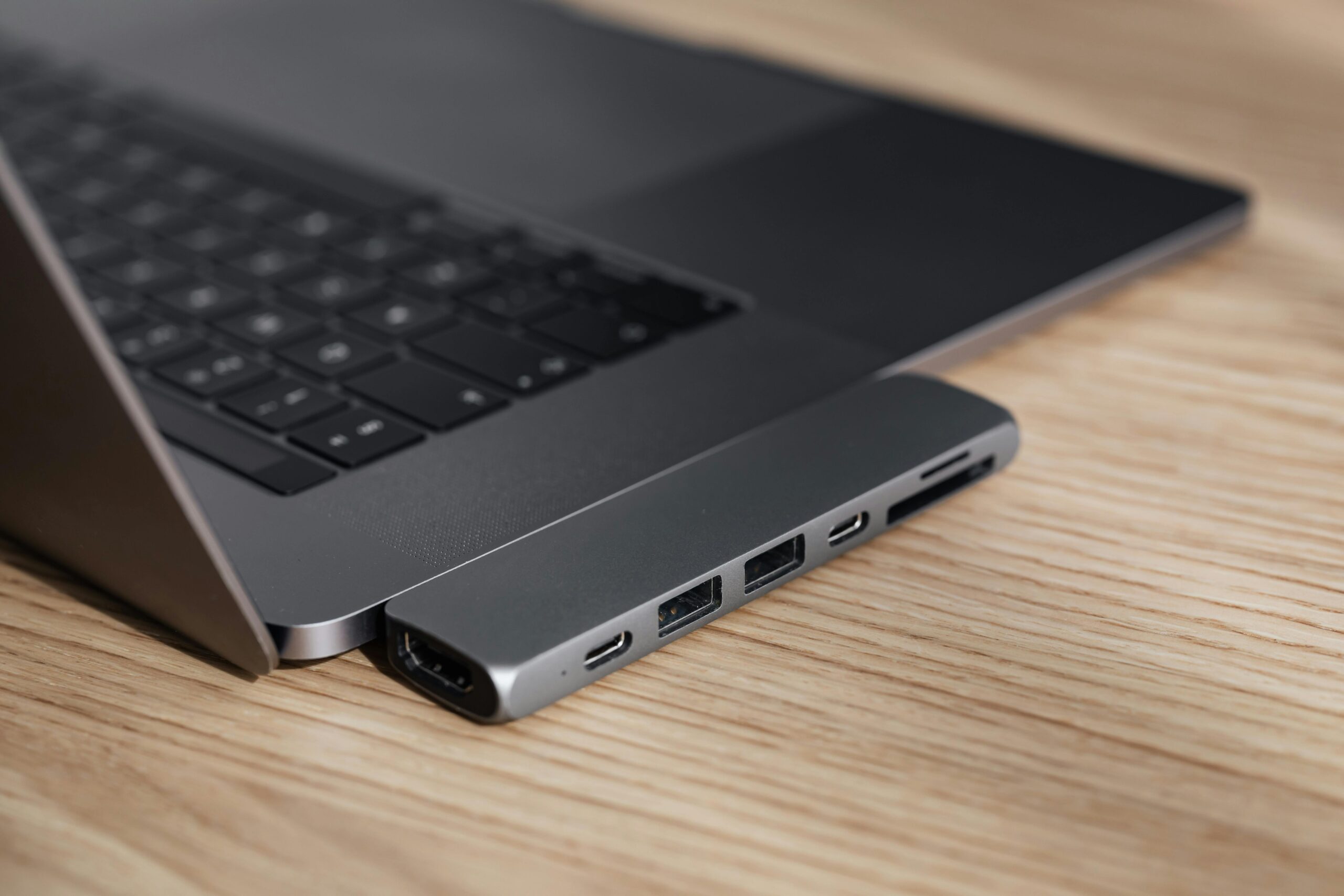USB Hubs – Maximizing Your Laptop’s Connectivity

USB hubs have become essential tools for users with laptops that have limited connectivity options. Whether you need extra ports for flash drives, printers, or other peripherals, a USB hub is a quick and affordable solution. In this article, we’ll dive into everything you need to know about USB hubs and how to choose the right one for your laptop.
1. What is a USB Hub?
A USB hub is a device that expands the number of USB ports available on your laptop. It acts as a splitter, taking one USB connection from your laptop and multiplying it into several others. Most USB hubs are compact and easy to carry, making them perfect for people on the go.
2. Types of USB Hubs
There are different types of USB hubs based on port type and speed, including:
- USB 2.0 Hubs: These are the most basic and affordable USB hubs. They offer transfer speeds up to 480 Mbps, which is sufficient for basic peripherals like keyboards and mice but slow for data transfer.
- USB 3.0 and 3.1 Hubs: These offer significantly faster transfer speeds (up to 5 Gbps for 3.0 and 10 Gbps for 3.1). If you frequently transfer large files or connect external storage devices, investing in a USB 3.0 or 3.1 hub is highly recommended.
- Powered vs. Non-Powered Hubs: Powered hubs come with their own power source, making them ideal for connecting power-hungry devices like external hard drives. Non-powered hubs rely on your laptop’s battery and are best for low-power devices like flash drives and printers.
3. Benefits of USB Hubs
USB hubs offer a variety of advantages for laptop users:
- Increased Port Availability: Many modern laptops, especially ultrabooks, come with very few ports. A USB hub provides extra ports for all your peripherals.
4. Data Transfer Efficiency and Speed
When choosing a USB hub, the speed and efficiency of data transfer is crucial, particularly if you often work with large files, such as videos, high-resolution images, or software backups.
- USB 3.0 or Higher: For faster data transfers, especially with external hard drives or SSDs, a USB 3.0 hub or above is a must. With transfer speeds of up to 5 Gbps, these hubs are significantly faster than their USB 2.0 counterparts, making them essential for those who need quick access to large volumes of data.
- Prioritize USB 3.1/3.2 for Future-Proofing: Investing in the latest USB hubs (USB 3.1 or 3.2) will future-proof your setup, as these models allow transfer rates of up to 10 Gbps or more, offering top-tier performance with cutting-edge devices.
5. Plug-and-Play Compatibility
Most USB hubs are designed to be plug-and-play, which means you don’t need additional drivers or software to start using them. This convenience ensures that the hub is immediately compatible with your laptop and peripherals, minimizing downtime and maximizing productivity.
- Universal Compatibility: USB hubs work with most operating systems, including Windows, macOS, and Linux. However, it’s always a good idea to double-check compatibility with your specific laptop model to avoid any potential issues.
6. Keeping Your Workspace Organized
Another major benefit of a USB hub is the ability to declutter your workspace by consolidating your connections into one place. Instead of plugging various peripherals directly into your laptop, a hub allows you to connect all your devices through one central point, minimizing tangled cables and creating a tidier work environment.
- Cable Management: Some hubs come with built-in cable organizers or mounts, helping you keep your desk neat while providing the necessary connectivity for your peripherals.
7. Special Features to Look Out For
When shopping for a USB hub, there are a few additional features you may want to consider depending on your usage needs:
- Fast-Charging Ports: Some USB hubs come with dedicated fast-charging ports, allowing you to quickly charge devices like smartphones and tablets without slowing down your data transfers.
- Ethernet Ports: If you need a stable, wired internet connection but your laptop lacks an Ethernet port, look for USB hubs with built-in Ethernet jacks.
- SD and MicroSD Card Readers: For photographers or anyone working with digital media, a USB hub that includes SD card slots can save time and make file transfers more efficient.
Conclusion
USB hubs are invaluable tools for expanding your laptop’s connectivity options. Whether you’re looking for more ports to connect essential peripherals or seeking faster data transfer speeds, a high-quality USB hub can dramatically improve your laptop experience. When choosing a USB hub, consider the types of devices you’ll be connecting, the speed requirements for data transfers, and whether you need additional features like fast-charging ports or Ethernet capabilities. Investing in the right USB hub will ensure your laptop remains versatile, organized, and ready for anything you throw at it.
By keeping your laptop in optimal condition and choosing the right accessories, including a reliable USB hub, you’ll extend its longevity and make the most out of your investment. Now that you’re equipped with this knowledge, you can confidently take steps to preserve your laptop’s performance while boosting its functionality with essential peripherals.
